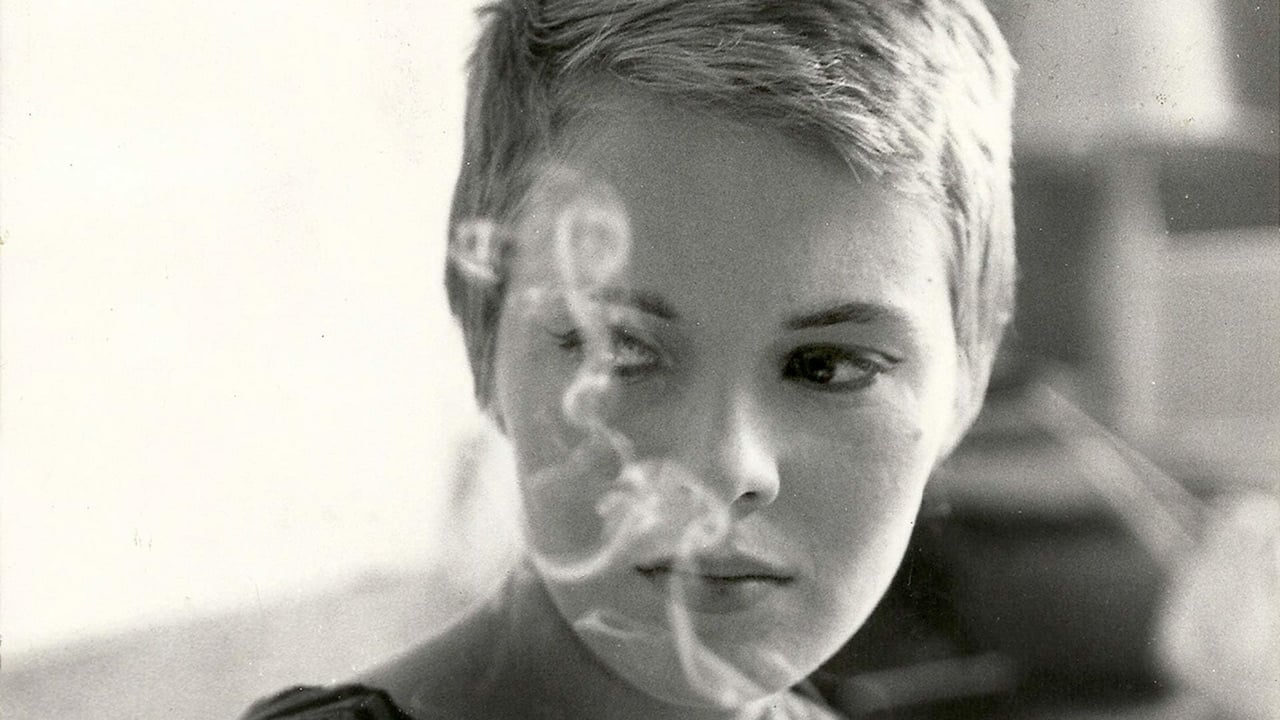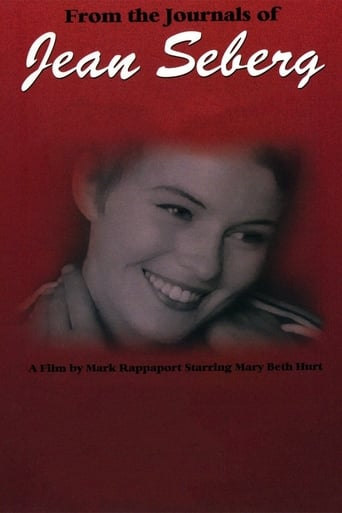

I rented this video essay because I was recently reminded of this great independent American director, many of whose works I saw a decade ago and loved, and started a fairly useless thread about him that got few replies on an IMDb forum. Apparently, he is still awfully underground and unknown.I don't know if this would change things even if I could magically get a bunch of people to see it. Basically, it's a 100-minute deconstruction of the late American actress Jean Seberg's career, with Seberg "played by" narrator Mary Beth Hurt, who (as stand in for both author/director Rappaport and the dead actress) offers a withering feminist critique of the roles, both on and offscreen, that naive small-town Iowa girl Seberg found herself thrust into from the moment she first auditioned for Otto Preminger's film of Bernard Shaw's Saint Joan in 1955 at the age of 17. Questioning the way in which male directors dominate and abuse female stars, the casting by so many men of their wives as whores and cheats, the pornography of suffering in every rendition of Joan and the choices that women - but not men - get pushed into making as they age, this is a wide-ranging look at both Hollywood and European morality in the film industry, at the politics of the late 60s and how they impacted Seberg and other star actresses like Jane Fonda and Vanessa Redgrave, and much more.A provoking and pointedly subversive and subjective document, rather than a "documentary", this is I think essential viewing for anyone interested in the politics and sociology of stardom, and for fans of Seberg, Preminger, Jean-Luc Godard and Clint Eastwood in particular. Those interested in Seberg's films should be warned that the endings of "À bout de soufflé", "Lilith" and "Bonjour Tristesse" are given away. I can imagine that many would find the approach here irritating and even offensive, particularly those more wedded to traditional documentary styles, but to me it is a masterpiece and not far off the level of Chris Marker ("Sans Soleil") and Orson Welles ("Filming 'Othello'") in this fairly rare cinematic form. Mark Rappaport is not after and probably doesn't believe in some kind of absolute "truth", some specific answer as to why Seberg's career and life ended the way they did, indeed he is willing to place some of the blame on the actress herself; he is interested in provoking discussion and thought, and in that he succeeds entirely.
... View MoreA wonderfully articulate film-essay using the life of Jean Seberg to demonstrate what is a star. Does not stick to the factual; brings interesting and somtimes intensely cynical socio-psychological support to the idea of the collective gaze. Really rich, really worth seeing.
... View MoreThe film as thesis. As a thesis, it's remarkably unfocused - Jean Seberg: victim; cinema, Preminger, Godard, Romain Gary, Clint Eastwood, FBI, America, Jane Fonda, Vanessa Redgrave, men: villains. Because this film isn't really interested in Jean Seberg - here she is interchangable with an aging soap star; she is a ghost, unproblematically dead; she is a hapless, helpless victim with no will of her own; she is tossed about by men, and yet here she speaks the words of her male creator, Mark Rappaport - but in the history of film, its ideologies and repressions. As these go, it is funny, informative and full of interesting and perceptive connections, but there are too many blatant distortions to actually accept it.
... View MoreWow! What a revelation this film is. It examines the life of Jean Seberg and how it is destroyed by her acting career. It is a complex film, one that really defies explanation. It combines film clips from her films and the films of other movie stars with dialogue spoken by Mary Beth Hurt as Jean Seberg. From her early career as a terrible actress in Preminger's Saint Joan to her quick comeback in Goddard's Breathless to her slow descent into madness after being hounded by the FBI, the film examines how the events affected the actress and also what they say about the world of Hollywood. The roles that women are offered are compared with those that men get. The function of the closeup is explained with examples dating back to the earliest films. The parallels in the careers of Jane Fonda, Vanessa Redgrave, and Seberg are shown. Seberg is also compared with Clint Eastwood and the development of his career through closeups is compared to hers. All of this may sound mundane, but it is not.The film exposes the assumptions of Hollywood and the effects of these assumptions on the audience. An earlier reviewer says that it is revisionist history, but it is simply an honest look at what Hollywood did then and still does today to women. Who are our big stars? Julia Roberts, who played a hooker to become famous. Demi Moore, who is paid to reveal her fake breasts. And about 8200 men. Calling this film politically correct or feminist simply allows the reviewer to ignore the facts that it presents. After seeing it, the viewer will never see film the same way again.
... View More